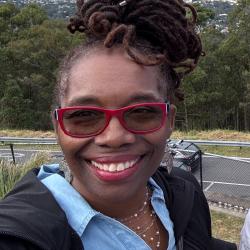Kim Fox, the Podcast Professor, works at The American University in Cairo. — this interview has been lightly edited for style and readability
This interview is from the Podnews Weekly Review
Kim Fox: I teach podcasting, I do academic research on podcasting and I also have a podcast.
James Cridland: What’s the podcast landscape like in Egypt and that part of the world? Is it very different to the podcast landscape here or in the US?
KF: I think it is. It’s really hard to nail down, because Egypt is a really trendy kind of market, meaning people will say “I’m listening to your podcast”, or “your podcast is popular”, but then after a couple of months or a year they will fall off as listeners, which will impact, of course, the person who’s doing the production. What I’m noticing is a lot of comedians are doing very well, which is a global trend as well. There’s a new company out called Potcast Production and they’re getting a lot of funding. I think they’re going to be the ones to watch out for, because initially they had seed money from within Cairo, but now they have some seed money from Saudi, so I think that’s going to be able to elevate them to do a little bit more in the space.
JC: Is it mostly audio or is there quite a lot of video in your world these days?
KF: Definitely doing video. Potcast say that they’re an audio first company, so they always release their audio first and then they’ll do the video, which I think is a smart move in terms of trying to build that listenership first, and they can see the numbers. So yeah, some people are going down that road. It’s hard to say if it is going to be a trend. From the heart of podcasting, we don’t really need video - that’s an added element, more labor to do it. So we’ll see.
JC: Now, you run an event in Cairo every year in March, Podfest Cairo - how did that go this year?
KF: It went really well. We had Latif Nasser from Radiolab as our keynote speaker. It was just so much fun to have him in town and he came to campus to talk to the students. We usually get around 50 to 60 people. Podfest Cairo is not a profit event and I usually do it by myself and sometimes I get busier than usual. So we usually get a nice small community of folks who come through, lots of regulars who’ve been to everyone, lots of newbies who are just trying to figure out hey, how is this thing done? Where’s my community? That kind of thing. So it’s been really a nice event to have on an annual basis. We’ve done five years, including the one year online during COVID. The other four have been face-to-face.
JC: Tell me about your students. Are they wanting to get into the radio sector? Are they wanting to get into podcasting? How do they see both of those media? Is radio for the old folk and they’re not really very interested in it, or how does it work?
KF: We have a commercial radio station here - I remember listening to them when I first got to Cairo - it’s called Nile FM and they’re very popular and our students are listening heavily. So when I thought like, yeah, radio’s dead, it’s like no, they know this station and they listen to that station a lot. Now, that is one of the few private stations in Cairo. So are they listening to these other government stations that are on? No, they’re probably not. So there’s that.
And then it’s just a matter of well, what are you listening to and where are you getting your music and where are you sharing knowledge and things like that. So some of them I’ve had quite a few who’ve gone on to do really well in audio, which is amazing.
JC: Kim, thank you so much for your time.
KF: Thank you.
